introduction
Cat food for sensitive stomachs is specially formulated to be easily digested and reduce gastrointestinal issues in cats. It often contains high-quality proteins as the main ingredient, plus easily digestible carbohydrates for energy. This type of cat food typically excludes harsh additives or artificial ingredients that might upset a cat’s stomach. Moreover, it may include prebiotics, probiotics, and fiber to support gut health. Always consult your veterinarian before switching your cat’s diet, especially if your cat has chronic stomach issues.
Cat food is for sensitive stomachs. Looking for cat food for sensitive stomachs? Our stodgiest varieties provide ultimate nutrition. Keep them purring with our top-notch food selection, the perfect solution for your feline friend’s sensitive stomach, and our comprehensive guide to cat food formulated specifically for digestive health.
Whether your cat experiences occasional digestive upset or has a chronic sensitivity, our blog explores the top cat food options designed to soothe delicate stomachs and promote digestive wellness. From limited-ingredient diets to specialized formulas with gentle ingredients, we cover everything you need to know to provide your cat with relief and support for their digestive issues. Join us as we navigate the world of cat food for sensitive stomachs and help you find the perfect solution to keep your beloved feline friend happy, healthy, and comfortable.
Identifying Sensitivity in Feline Stomachs
Feline stomach sensitivity bears certain signs. Frequent vomit spells can be a symptom. A cat might experience diarrhea often. Too. These issues could arise due To a sensitive stomach. Swift identification aids in faster recovery. Kohapet’s comprehensive guide can help identify food sensitivity in cats.
A change in appetite can signify stomach sensitivities. Constant weight changes can be signs as well. A vet must examine The feline if she shows such symptoms. A balanced diet may help boost her health.
Issues related To food intolerance. The feline might scratch a lot. Their fur could fall out disproportionately. In extreme cases of intolerance. The feline might develop a rash. An expert opinion is crucial for these scenarios.
Cats can be sensitive creatures, especially when it comes to their stomachs. Identifying sensitivity in feline stomachs is crucial for ensuring your cat’s health and well-being. In this guide, we’ll explore the common signs and symptoms of stomach sensitivity in cats and provide tips on how to manage and alleviate these issues.
- Vomiting and Regurgitation: One of the most common signs of stomach sensitivity in cats is vomiting or regurgitation. While the occasional hairball or upset stomach is normal, frequent or persistent vomiting may indicate an underlying sensitivity to certain foods or ingredients. Keep track of how often your cat vomits and whether there are any patterns or triggers.
- Diarrhea and Loose Stools: Diarrhea and loose stools are another common symptom of stomach sensitivity in cats. If your cat experiences frequent bouts of diarrhea or has consistently loose stools, it could be a sign of food intolerance or digestive issues. Pay attention to your cat’s bowel movements and consult your veterinarian if you notice any abnormalities.
- Decreased Appetite or Weight Loss: Cats with stomach sensitivity may experience a decreased appetite or weight loss due to discomfort or nausea. If your cat suddenly loses interest in food or starts to lose weight, it’s essential to investigate the underlying cause, which may include food allergies, intolerances, or gastrointestinal issues.
- Flatulence and Excessive Gas: While it may seem humorous, excessive flatulence or gas in cats can be a sign of stomach sensitivity. If your cat experiences frequent or foul-smelling gas, it could indicate digestive issues or difficulty tolerating certain foods. Pay attention to your cat’s digestive habits and consult your veterinarian if you notice any concerning symptoms.
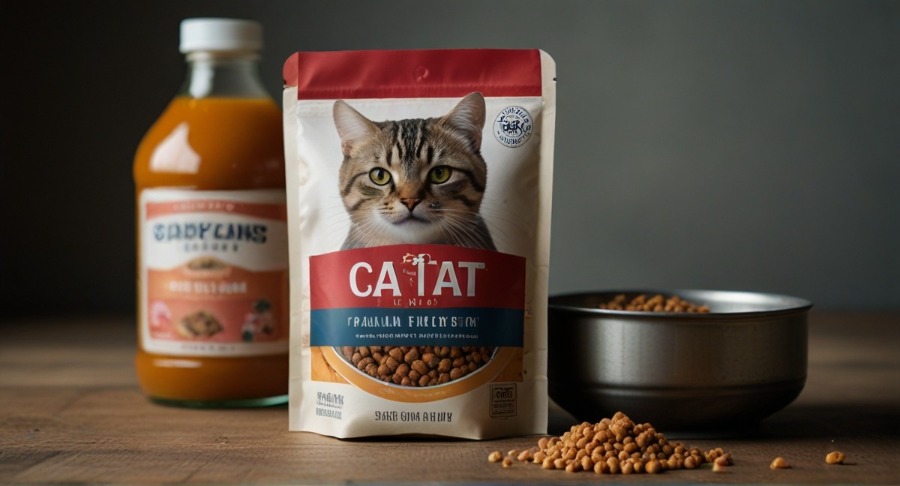 Understanding Feline Diet Sensitivity
Understanding Feline Diet Sensitivity
Not all felines have similar digestive capacities. Some exhibit sensitivities towards certain nourishments. referred to as food intolerances. These reactions vary. A few conditions may need dietary modifications.
Dairy products might not suit all felines. For instance. Many can’t digest lactose. Found mainly in milk. An imbalance occurs in their digestive system if lactose is consumed. Their tummies protest. Resulting in unease.
Grains are another category that causes indigestion. Even though The majority of cat food contains them. Not all cats can digest them. Cats are carnivores, & their systems are built To digest meat. Grains sometimes don’t align with their digestive systems.
Nourishment Options for Cats with Sensitive Stomachs
Cats with sensitive tummies need special diet plans. Specific dietary practice can be crucial for their health. Giving them suitable nourishments can boost their overall wellbeing. Alternative cat food options are suggested in a resourceful Business Insider guide.
Single protein cat foods are a popular choice. They are easier for The feline’s body process. High digestibility ensures less strain on their digestive system. Single protein foods are a safer option due To their simplicity.
Grain free cat foods are another good option. As explained earlier. Grains may not suit all felines. Hence. Grain free dietary options are preferred for sensitive tummies. Fish. Chicken, & venison are good protein sources in various grain free cat foods.
Dealing with Cat Stomach Sensitivities
A sensitive stomach may need particular care. Gradual dietary shifts might help them. Avoid sudden shifts in meals as that may upset their stomach more. The transition from old food new one should be smooth.
Probiotics may also help with digestion. They create a healthy gut environment. They reduce inflammation & balance gut bacteria. As a result. The digestion process smoothest out.
Adequate hydration is another crucial factor. Make sure your feline friend drinks enough water daily. Water aids in digestion & keeps constipation at bay. A wet diet can ensure a well-hydrated cat.
My Personal Experience with My Cat’s Stomach Sensitivity
From personal experience. I dealt with this unsettling issue. My cat, “Fluffy,” started rejecting her regular meals. Vomiting became a frequent affair for her. On consulting The vet,. We found out about her stomach sensitivity. Changing her diet based on doctor’s recommendations started showing positive results. She started accepting her meals, & vomiting slowly decreased. No. She enjoys her meals & seems happier!
Features of Good Cat Food for Sensitive Stomach
- 🍗 Single protein based cat food
- 🌾 Grain free formula
- 💦 Hydrating & moisture rich
- 🏥 Added probiotics for gut health
- 🥦 Includes necessary fibers
- 🍖 Real meat as The first ingredient
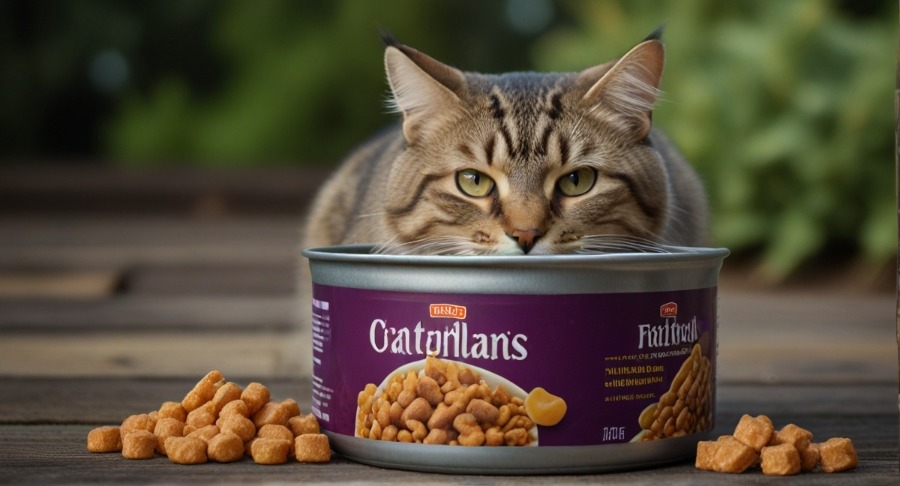 Choosing Right Cat Food for Sensitive Stomach
Choosing Right Cat Food for Sensitive Stomach
Choosing The right cat food for sensitive tummy involves research. Always read The ingredient list before making a choice. Avoid options with fillers or synthetic elements.
Choose products with quality ingredients. These feline friends deserve The best & healthiest nutrition options. High-quality products ensure robust health. They also maintain a shiny appearance. Healthy fur coat. Enhancing their beauty.
Another thing To consider is dietary balance. The food should provide essential nutrients. It should support healthy living. Keeping them active & joyful throughout The day.
Probiotics for Cats with Sensitive stomach
Probiotics are beneficial for sensitive stomachs. These good bacteria live in The intestines. They maintain balance in The gut. They also aid in digestion by breaking down food compounds.
Probiotics are available in various forms. Some cat foods integrate them in The blend. However. They also come in separate supplements. It’s advisable To consult with The vet before starting probiotics.
Adding probiotics Your cat’s diet can promote gut health. They ward off any harmful microorganisms. They support digestion & reduce inflammation. Thus. Probiotics make a good addition for cats with a sensitive stomach.
Hydration in Diet for Cats with Sensitive Stomach
Water plays an important role in digestion. It helps in breaking down food & absorbing nutrients. Thus. Proper hydration is essential for felines with a sensitive stomach.
Water flushes toxins from The body & keeps it hydrated. Wet cat food can be a good source of water for your feline friend. The moisture content in wet food can help them stay hydrated.
Make sure it is clean. Fresh water is available at all hours. This will keep them from drinking from contaminated sources. Also. Make sure they are not ignoring their water bowl. A hydrated cat is a happy cat!
Understanding Cat Food for Sensitive Stomach
Where a cat’s diet needs modification. Sensitivity in stomach could be a possible reason. Gastrointestinal complications may necessitate a switch in The daily meals consumed. Not all food processing methods or ingredients will agree with every cat’s digestive system.
They may manifest allergies or intolerances. Identification of such adverse food reactions requires that you observe your feline friend closely. When signs like frequent vomiting. Diarrhea. Or low appetite surfaces. You may consider changing what your cat imbibes daily.
Often. Sensitivity Food arises from specific components in feed. These could include dairy products. Seafood. Or even grains. Your feline’s diet requires a careful balance. Eliminating ingredients that may cause discomfort. Understanding Cat Food for Sensitive Stomach,” we delve into the world of feline digestive health, exploring the challenges faced by cats with sensitive stomachs and the solutions offered by specialized cat food. From common symptoms to key ingredients and formulations, we provide valuable insights to help cat owners navigate the complexities of finding the right food to soothe their furry friend’s digestive issues. Join us as we uncover the essentials of cat food for sensitive stomachs, empowering you to make informed choices that prioritize your cat’s comfort and well-being.
Selecting Appropriate Feed for a Sensitive Stomach
Choosing an appropriate feed for cats with sensitive stomachs may necessitate assistance from a veterinarian. With their expertise,. They can help determine types of food your cat should avoid. They can also recommend suitable diet changes. To make this decision. Consider your cat’s nutritional needs & preferences.
Also. Note that a diet designed for sensitive stomachs caters primarily To soothing The stomach. Looking at vet-approved selections & comparing compositions of different brands can help narrow down choices. Through comparison. Determine what feed would best meet your cat’s health needs.
While selecting feed. Focus on brands emphasizing simplicity in their ingredient list. Brands with minimal components stand a lower chance of triggering sensitivities. opt for formulas that contain a single protein source & exclude common allergens. Explore adding Purina’s Sensitive Stomach Formula To your pet’s diet as a good start.
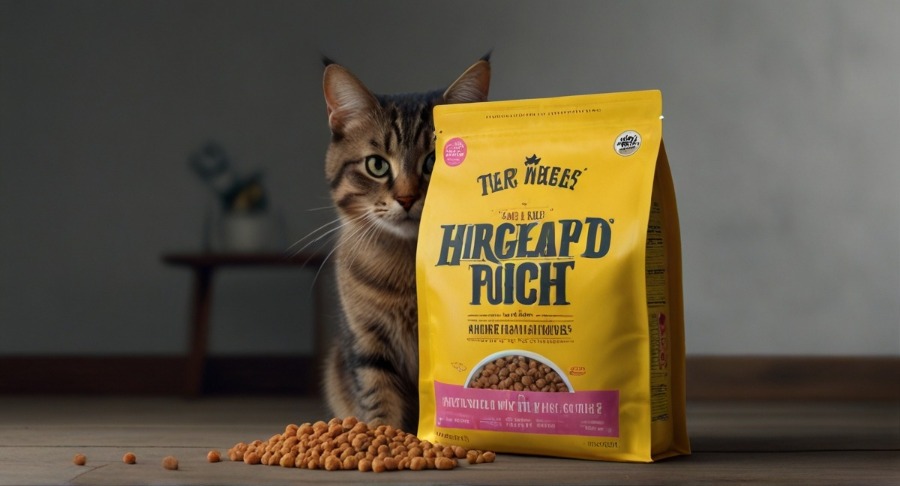
Beneficial Ingredients in Cat Food
Ingredients beneficial To cats with sensitive stomachs, include lean. Easily digestible proteins. Chicken. Turkey. Or rabbit have proved helpful. Avoid tougher proteins like beef unless confirmed safe by a vet.
Your cat may also require dietary fiber. Natural grains. Such as rice or corn. Provide necessary fiber. Though grains have been implicated in some allergies,. Confirmation still needs To precede elimination.
Essential fatty acids are good for sustaining optimal health in your cat. Omega3 & omega6 fatty acids promote a healthy coat. Increase nutrient absorption & reduce inflammation.
Choosing the right cat food is crucial for supporting your feline friend’s health and well-being. Understanding the ingredients listed on the label can help you make informed decisions about what to feed your cat. In this guide, we’ll explore some of the most beneficial ingredients commonly found in cat food and how they contribute to your cat’s overall health
Avoiding Certain Ingredients
Some ingredients. Although common in cat food,. Could exacerbate sensitive stomachs. These need To be circumvented To avert further complications. Topmost in this category are food colorings & artificial flavors, which can trigger allergies.
Excessive carbohydrates may also burden a kitten’s digestive system. Counterbalance high protein content with a controlled carbohydrate addition. A cat’s digestive system has little use for fillers & byproducts; avoid these in cat feed.
Dairies & raw food diets. If not checked,. Potentially straighten your pet’s stomach. Food processing techniques such as rendering can extract essential nutrients your cat requires. Leaving less beneficial meals devoid of crucial nutrients.
Transitioning To New Food
Transitioning your cat To a new diet must be gradual. Abrupt alterations can disrupt your cat’s digestive system. Hence. It’s vital To blend food & allow your cat To adapt.
Incorporate The new food by substituting a small portion of The old diet with The new one. With each passing day. Increase The proportion of new food. This way. Your feline has ample space To accommodate The switch comfortably.
Backing this process is my personal experience. Transitioning my feline friend To a new diet helped alleviate its frequent vomiting & diarrhea incidents. Consequently. I observed that gradual food change resulted in an overall health improvement.
✨Comparison Table for Sensitive Stomach Cat Food✨
| Brand | Primary Protein | Allergen Free | Contains Additives | Price |
|---|---|---|---|---|
| Purina ONE | 🐔Chicken | ✅ | ❌ | $$ |
| Blue Buffalo | 🐠Fish | ✅ | ❌ | $$$ |
| Royal Canin | 🦃Turkey | ✅ | ✅ | $$$ |
importance of Regular Checkups
Regular checkups with your vet monitor your cat’s health. They aid in The timely identification of issues before they escalate.
Upon implementation of a new diet,. Stay keen for any positive or adverse reactions that your cat might present. In case of any uncertainty. Consult your vet immediately.
Moreover. If your cat continues To display discomfort after a dietary change,. Seek medical advice. Keep in mind that sensitivity may not always be due To diet. Check out more articles related To pet food on petfoodopia.com
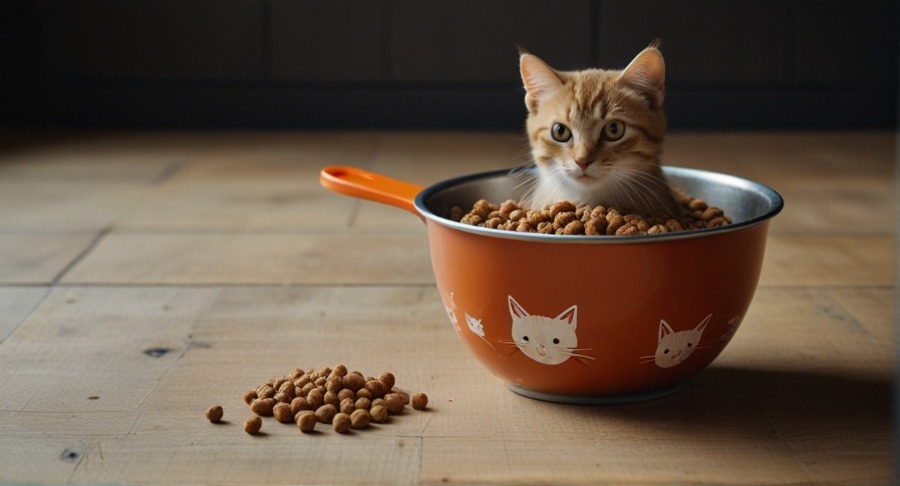
frequently asked question
What is The best cat food for a sensitive stomach?
Cats with sensitive stomachs might benefit from high-protein diets. Low-carb diet that is easy To digest. Added fiber can also help regulate their bowels & reduce symptoms. Brands like Blue Buffalo Sensitive Stomach. Hill’s Science Diet Sensitive Stomach & Royal Canin Digest Sensitive are often recommended.
What ingredients should I avoid in cat food for a sensitive stomach?
For cats with a sensitive stomach. You should avoid foods containing artificial colors. Flavors. Or preservatives. These can cause irritation & inflammation. Other potential triggers include grains. Gluten. Dairy products. Beef. Seafood, & certain vegetables like onions & garlic.
Can a cat’s sensitive stomach be due To food allergies?
Yes. Food allergies can cause sensitivities in cats. Dietary allergies in cats frequently manifest as skin irritations. But they can also result in digestive issues. If you think your cat has a food allergy,. Consult with a vet. They may suggest an elimination diet To identify The allergen.
How can I help my cat’s sensitive stomach at home?
If your cat has a sensitive stomach,. Feeding them a bland diet can help. This could include boiled chicken & rice or special cat food formulated for sensitive stomachs. Offering smaller. More frequent meals can also lessen The impact on their digestive system.
Why does my cat throw up after eating?
Cats may vomit after eating for several reasons. It could be due To eating too quickly. Hairballs. Or a more serious underlying health issue such as kidney disease or hyperthyroidism. If your cat vomits frequently,. Especially if there are other signs of illness. Consult your vet.
What should I do if my cat has a sensitive stomach & is unwilling To eat?
A loss of appetite in cats can signal serious health problems & should always be addressed by a vet. If your cat has a sensitive stomach & is avoiding food,. They may find a bland diet or specially formulated cat food for sensitive stomachs more tolerable. Be sure To consult your vet for The best course of action.
Conclusion
So there you have it, friends—the lowdown on cat food for sensitive stomachs. We can’t stress enough The importance of providing The right diet for your furry little friend who is dealing with a tender tummy. Remember, not all cats are The same, & what works for one may not work for another. This is why it’s crucial To keep in close contact with your vet and make changes as needed.
Avoiding foods with artificial additives, filling meals up with lean proteins, & kicking any hard-To-digest ingredients To The curb are all key steps To helping your kitty achieve dietary bliss. Specialized cat food for sensitive stomachs might just be The solution that puts The purr back in your feline friend’s life, reducing unpleasant symptoms & promoting overall health & happiness.
But remember, when changing your cat’s diet, it’s always a bit of a balancing act. Take things slow & monitor your fur-baby’s response To ensure you’re going in The right direction.
We hope this information helps shed light on how you can create a more comfortable & pleasant mealtime for your cat. After all, our fluffy friends deserve The best care possible To live their nine lives To The fullest. Good luck, everyone, & happy feeding!

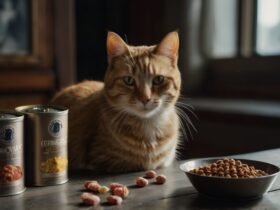



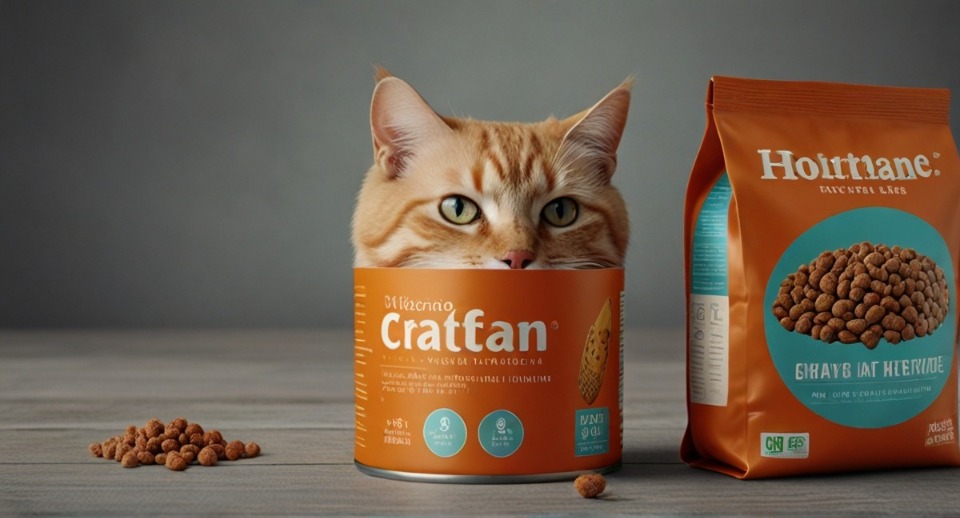
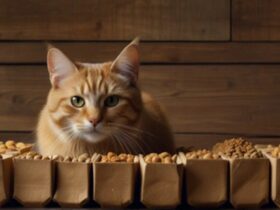
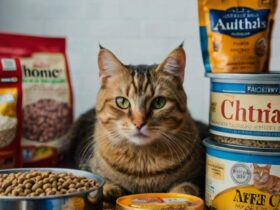
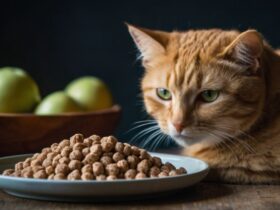
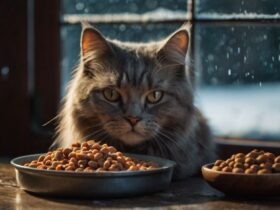
Leave a Review